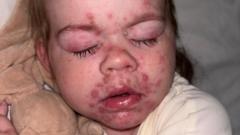Is Your Child Getting the NHS Chickenpox Vaccine?

Published: 2025-08-29 00:07:04 | Category: technology
This article discusses the introduction of a free chickenpox vaccine for young children in England and Wales, which will be offered by the NHS starting January 2026. The vaccine, administered in two doses at 12 and 18 months alongside the MMR jab, aims to protect children from the varicella virus and its potential complications, while also alleviating the financial burden on parents.
Last updated: 27 October 2023 (BST)
Key Takeaways
- The NHS will offer a free chickenpox vaccine to children starting January 2026.
- The vaccine will be administered as two doses combined with the MMR vaccine.
- A catch-up campaign will be implemented for older children.
- Chickenpox can lead to severe complications, particularly in vulnerable populations.
- Experts believe vaccination will significantly reduce the incidence of chickenpox cases.
Understanding Chickenpox and Its Impact
Chickenpox, caused by the varicella zoster virus (VZV), is a common childhood illness characterised by itchy red spots and blisters. While generally mild for most children, it can lead to severe complications in certain populations, including infants, pregnant women, and adults. The NHS's decision to offer a free vaccine aims to address these risks and enhance public health.
Why the Vaccine is Necessary
The introduction of the chickenpox vaccine is timely, especially as chickenpox is responsible for an estimated £24 million in lost income and productivity annually in the UK. The vaccine not only aims to protect children from the immediate symptoms but also to prevent the potential long-term complications that can arise from the illness.
Current Vaccination Landscape
Currently, parents who wish to protect their children against chickenpox must pay for the vaccine privately, which can cost up to £200. This financial barrier has limited access for many families. The new policy aims to eliminate this barrier and ensure that all children have access to the vaccine.
The Vaccine Schedule
The chickenpox vaccine will be administered in two doses—first at 12 months and then again at 18 months of age. It will be combined with the existing MMR vaccine, which protects against measles, mumps, and rubella. This combination is designed to streamline childhood immunisations and improve overall vaccination rates.
Addressing the Catch-Up Campaign
In addition to the standard vaccination schedule, the NHS plans to implement a catch-up campaign for older children who may have missed the opportunity to receive the vaccine. This initiative will be crucial in ensuring that as many children as possible are protected against chickenpox.
Potential Complications of Chickenpox
Although chickenpox is often mild, it can lead to serious complications, including:
- Encephalitis: A rare swelling of the brain.
- Pneumonitis: Inflammation of the lungs.
- Stroke: Rarely, chickenpox can cause strokes, resulting in severe health issues.
These complications highlight the importance of the chickenpox vaccine in protecting vulnerable populations, including pregnant women, very young infants, and adults.
How Chickenpox Spreads
Chickenpox is highly contagious and can spread through direct contact with an infected person or via airborne droplets from coughs and sneezes. Symptoms often begin with flu-like signs, such as fever and headache, followed by the characteristic rash that appears one to three weeks after exposure. This rash progresses from red spots to fluid-filled blisters, which are contagious until they crust over.
Expert Opinions on Vaccination
Experts, including Dr Gayatri Amirthalingam from the UK Health Security Agency, have stated that the vaccination could be a "life saver" for many children. Vaccination is expected to dramatically reduce the number of chickenpox cases and consequently the incidence of severe complications.
Real-Life Experiences with Chickenpox
Sarah, a mother of two daughters, shared her traumatic experience with chickenpox after both her children required hospital treatment. She described the severe illness her youngest daughter, Mia, experienced, stating, "It was just an awful situation to be in. It was absolutely terrifying." Such accounts underline the necessity of the vaccine for preventing severe cases.
Vaccine Efficacy and Public Health Goals
The chickenpox vaccine is expected to reduce the overall risk of contracting the virus to near zero. Even if vaccinated individuals do contract chickenpox, they typically experience milder symptoms. The vaccine's introduction aligns with public health goals to improve childhood vaccination rates, especially as recent data reveals that uptake for other childhood vaccines is below the desired target of 95%.
Future Vaccination Plans in Scotland and Northern Ireland
While the announcement pertains specifically to England and Wales, Scotland and Northern Ireland are also expected to introduce the chickenpox vaccine through their NHS systems. However, specific timelines for these developments have yet to be announced.
Conclusion
The NHS's decision to offer a free chickenpox vaccine is a significant step forward in public health in the UK. By ensuring that all young children have access to this vaccine, the government aims to protect families from the hardships of chickenpox and its potential complications. As the implementation date approaches, it raises important questions about the future of childhood vaccinations and the role of public health in preventing communicable diseases.
As we await the rollout of this vital vaccine, one must consider: How will this change the landscape of childhood illnesses in the UK? #ChickenpoxVaccine #NHS #ChildHealth
FAQs
What is chickenpox?
Chickenpox is a highly contagious disease caused by the varicella zoster virus, leading to an itchy rash and flu-like symptoms. It's common in children but can have serious complications in some cases.
When will the chickenpox vaccine be available for children?
The chickenpox vaccine will be offered free of charge to young children in England and Wales starting in January 2026, with a catch-up campaign for older children planned.
How many doses of the chickenpox vaccine will children receive?
Children will receive two doses of the chickenpox vaccine, administered at 12 and 18 months of age, alongside the MMR vaccine.
What are the benefits of the chickenpox vaccine?
The chickenpox vaccine significantly reduces the risk of contracting the virus, and even if vaccinated individuals get chickenpox, they usually experience milder symptoms.
Are there any risks associated with the chickenpox vaccine?
Like all vaccines, the chickenpox vaccine may have some side effects, but serious complications are rare. The benefits of vaccination generally outweigh these risks.



